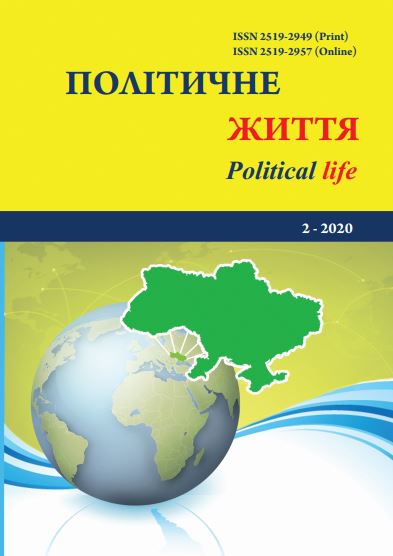Ensuring national security in the context of Ukraine's participation in international organizations.
DOI:
https://doi.org/10.31558/2519-2949.2020.2.16Keywords:
international organizations, national security of Ukraine, Ukrainian legislation, normative-legal base, non-military means of ensuring security, crisis settlementAbstract
The article considers the possibilities and available tools of international organizations to promote national security of Ukraine on the background of the transformation of the system of international relations, caused by the revision of fundamental norms of international law by individual states.
The paper analyzes several approaches to interaction with international organizations in matters of national security, which are reflected in the legal framework of Ukraine: reliance on the assistance of international organizations and blocs in ensuring the sovereignty and territorial integrity of the state; lack of developed clear and consistent mechanisms for cooperation with international organizations to achieve national security goals; lack of understanding of the real, rather than declarative, capabilities of international organizations to ensure the national security of member states and partners.
In order to overcome these problematic aspects of imposing on international organizations part of the obligations to ensure national security, identified key areas of cooperation between state authorities of Ukraine and certain international structures, which with the use of non-military means have the opportunity to promote national security in Ukraine.
It is concluded that there are prerequisites for the inclusion of mechanisms of international organizations in the system of national security of Ukraine in the following areas: information, military-civil and economic.
Given the projected preservation of the essential role of international organizations in crisis management and peacekeeping, it is considered appropriate to develop a consistent algorithm for cooperation of Ukrainian authorities with international organizations in areas that will contribute to national security of Ukraine.
References
Стратегія національної безпеки України : Указ Президента України від 26.05.2015 року №287. URL: http://zakon.rada.gov.ua/laws/show/287/2015 (дата звернення: 08.06.2020).
Єдиний державний реєстр міжнародних організацій, членом яких є Україна станом на 01.01.2020. URL: https://data.gov.ua/dataset/89ea21a9-e0bf-4cac-a05e-c3da6e63d360/resource/eccd8762-2184-4fb3-8e73-6a491528d03d (дата звернення: 08.06.2020).
Аблазов І. В. Воєнно-політичні цілі держави та невоєнні засоби їх досягнення / І. В. Аблазов. Трибуна. 2007. № 9-10. С. 16–17.
Кондаков Е. Е. Невоенные меры обеспечения военной безопасности Российской Федерации и основные проблемы их реализации URL: https://flot.com/publications/books/shelf/safety/11.htm (дата звернення: 08.06.2020).
Nye J. The Benefits of Soft Power. Harvard Business School Web Site. URL: http://hbswk.hbs.edu/archive/4290.html (дата звернення: 08.06.2020).
Nanto Dick K. Economics and National Security: Issues and Implications for U.S. Policy / Dick K. Nanto. – Washington: Congressional Research Service, 2011. – 82 p.
Гончар М.М. Гибрессия Путина. Невоенные аспекты воен нового поколения / за заг. ред. М. М. Гончара. Фрагмент дослідження в рамках проекту «Антарес». К.: Центр глобалістики «Стратегія ХХІ», 2016. – 62 с.
Хоменко Г.Д. Основи миротворчості : Навчальний посібник. К.: Видавничий дім «ДЕМІД», 2008. 312 с.
Сирота Н.М. Политическая конфликтология : Учебное пособие / Під ред. Н. Сироти. М.: ИВЭСЭП, 2015. 112 c.
Про основи національної безпеки України : Закон України / Верховна Рада України. (Втратив чинність 08.07.2018) URL:http://zakon.rada.gov.ua/laws/show/964-15 (дата звернення: 10.06.2020).
Про Воєнну доктрину України : Указ Президента України від 15.06.2004 року №648/2004.
(Втратив чинність на підставі Указу Президента України №555/2015 від 24.09.2015) URL:http://zakon.rada.gov.ua/laws/show/648/2004 (дата звернення: 10.06.2020).
Global Trends 2035: Paradox of Progress. Washington D.C., 2017. 235 p. URL: https://www.dni.gov/files/documents/nic/GT-Full-Report.pdf (дата звернення: 10.06.2020).
Charter of the United Nations and Statute of the International Court of Justice. URL: https://treaties.un.org/doc/publication/ctc/uncharter.pdf (дата звернення: 10.06.2020).
The North Atlantic Treaty. URL: https://www.nato.int/cps/en/natohq/official_texts_17120.htm?
(дата звернення: 10.06.2020).
The Allience’s Strategic Concept. URL: https://www.nato.int/cps/en/natolive/official_texts_68580.htm
(дата звернення: 10.06.2020).
Lobjakas Ahto. Estonia: Fearing “Decoding” by Russia / Toms Rostoks, Andris Spruds, and others.
The different faces of “soft power”. Riga: Latvian Institute of International Affairs, 2015. C. 202-220.
75 percent of cases of interference in OSCE SMM work took place in Donbas : Interview with OSCE SMM head Ertugrul Apakan on September 7, 2017. URL: https://112.international/conflict-in-eastern-ukraine/75-percent-of-cases-of-interference-in-osce-smm-work-took-place-in-donbas-20532.html (дата звернення: 10.06.2020).
Sagramoso D. Russian Imperialism Revisited: From Disengagement to Hegemony. Abington, Oxon: Routledge, 2020. 386 p.
80% of OSCE observers in Mariupol are Russians. Interview with Vasyl Budyk (advisor to Minister of Defense of Ukraine) on November 11, 2014. URL: https://zik.ua/en/news/2014/11/11/80_of_osce_observers_in_mariupol_are_russians_539601 (дата звернення: 10.06.2020).
Новикова Д.О. Новые инструменты международного кризисного урегулирования: опыт Европейского Союза. М.: МГИМО–Университет, 2009. 112 с.
Rostoks Toms, Potjomkina Diana. Soft power of the EU and Russia in Eastern Europe / Toms Rostoks, Andris Spruds, and others. The different faces of “soft power”. Riga: Latvian Institute of International Affairs, 2015. P. 243-256.

